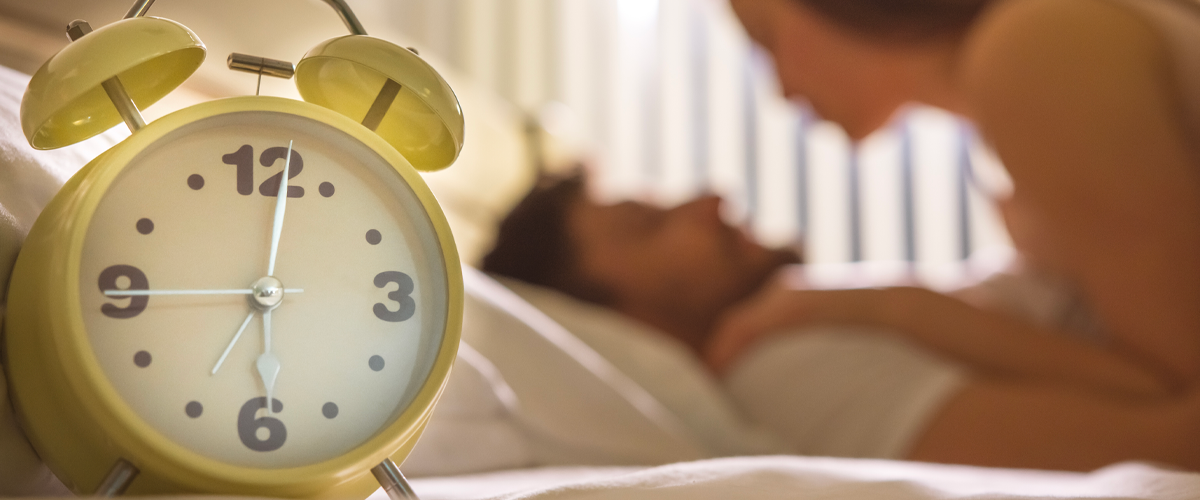We all know that success is not just about making money and climbing the corporate ladder. It’s about having a well-rounded life, including a healthy and fulfilling intimate relationship. And what better way to kick-start your day than with a morning romp? That’s right – there are some serious health benefits to starting your day off with some bedroom action. From increased productivity and mental clarity to better heart health, morning sex is the ultimate move for men looking to optimise their life.
So, put down your morning coffee and listen up as we explore the reasons why sex first thing in the morning is the secret weapon you need to take your life to the next level.
For starters, you’re already in bed
One of the best things about morning sex is the convenience factor. There’s no need to plan and schedule a specific time for intimacy with your partner because you’re already in bed. It’s like having a bonus round of fun before you start your day.
So, next time you wake up feeling frisky, don’t hit that snooze button. Take advantage of the fact that you’re already in bed and enjoy some morning delight with your partner.
It can boost your mood
Sex after a good night’s sleep can be an instant mood booster in more ways than one. It can trigger the release of endorphins, which are natural feel-good hormones that can help boost your mood.
But beyond the physiological benefits, morning sex can also create better connection and intimacy with your partner that can help to improve your overall emotional state. It can be a great way to start the day feeling happy and loved, which can in turn help you to feel more confident and positive about yourself and your life.
And let’s face it – there’s just something special about waking up next to your partner and enjoying a steamy session together that carries over into other areas of your relationship, making you feel more connected and supported throughout the day.

It can make you more productive
If you’re looking for an edge to help you tackle your to-do list, morning sex might just be the game-changer you’ve been searching for. Studies have shown that engaging in sexual activity in the morning can lead to increased productivity throughout the day¹.
How? Well, it’s simple. Morning sex can help to release endorphins and oxytocin, which are chemicals that promote feelings of happiness and relaxation². This, in turn, can help to reduce anxiety, allowing you to focus more clearly on your tasks at hand³.
So, if you want to start your day off on the right foot and power through your work with ease, it’s time to become a morning person and prioritise a little AM intimacy as a key part of your daily schedule.
It can help beat stress
You may be surprised to learn that morning sex can be the key to reducing stress and smashing through your daily grind. But science doesn’t lie. Studies have shown that engaging in sexual activity in the morning can release endorphins and oxytocin, two powerful chemicals that can help reduce stress levels and promote feelings of relaxation and well-being²⁻³.
As you probably know, stress can negatively impact both your physical and mental well-being, causing exhaustion, anxiety, and even depression. But morning sex can help you combat these effects and set a positive tone for the day ahead. So don’t let stress hold you back – take charge of your day with the power of morning sex.
It promotes a greater connection with your partner
Morning sex can help foster a stronger emotional and physical connection with your partner. Starting your day with a sexual romp provides a unique opportunity to enjoy a shared experience, one that can deepen your emotional bond and enhance your physical intimacy. The heightened levels of oxytocin, also known as the “love hormone,” released during sexual activity can lead to increased feelings of trust, love, and affection⁴.
Additionally, morning sex can create mutual satisfaction and shared intimacy that can enhance your relationship and promote stronger feelings of togetherness⁵. Plus, the benefits extend beyond the bedroom – couples who engage in regular sexual activity are more likely to engage in other forms of physical affection, such as hugging and kissing, leading to a more solid connection⁶.

It’s similar to a workout
Just like exercise, sex burns calories. Sexual activity requires physical exertion and can increase your heart rate, providing a cardiovascular workout⁷. Depending on the intensity and duration of the sexual activity, it can also provide a muscular workout, engaging many different muscle groups throughout the body⁸.
Another way that morning sex is similar to a workout is that it can provide a sense of accomplishment and satisfaction. After engaging in sexual activity, just like after a workout, you may feel a sense of pride and achievement, which can help boost your confidence and self-esteem⁸. So if you’re looking to achieve these benefits without leaving home, skip the gym. Have sex instead.
Your testosterone levels are higher in the morning
One of the benefits of morning sex is that it takes advantage of the higher testosterone levels that men typically experience first thing daily. Testosterone is a hormone that plays a key role in male sexual function, and it is also involved in many other physiological processes, such as muscle growth, bone density, and red blood cell production⁹.
Research has shown that testosterone levels tend to be highest in the morning, with levels gradually declining throughout the day¹⁰. This means that pre-sunrise sex can be a great way to capitalise on these natural hormonal fluctuations and enjoy the physiological benefits that higher levels of testosterone can provide.
For example, higher testosterone levels have been linked to increased sexual desire and improved sexual function in men¹¹. And testosterone is known to promote muscle growth and strength, which can be beneficial for physical performance in and out of the bedroom⁹.

The male body is programmed for morning sex
The male body is naturally primed to experience higher levels of testosterone and sexual desire in the morning. The increase in testosterone levels in the morning can lead to a greater desire for sex and greater sexual performance. Additionally, men may experience stronger erections when having sex in the morning due to the physiological changes that occur during sleep. During the rapid eye movement (REM) stage of sleep, blood flow to the penis increases, which can lead to morning erections¹².
Sex in the morning can also help men wake up and feel more alert and energised and increase blood flow and oxygen to the brain, which can help to improve cognitive function and overall brain health¹³.
Tiredness is less likely to be an excuse to skip sex
Tiredness is a common excuse for many couples to skip sexual activity, especially after a long and exhausting day. However, engaging in sexual activity in the morning can be an effective way to overcome this excuse.
One of the main reasons for this is that during sleep, the body naturally replenishes its energy levels, which can make a person feel more refreshed and energised in the morning. This can help to counteract the feelings of fatigue and lethargy that may be experienced at the end of the day.
Another benefit of morning sex is that it does not require the same level of physical and mental effort as sex at the end of a long day. In the evening, individuals may be more likely to feel tired and less motivated to engage in sexual activity. However, in the morning, the body and mind are typically more rested and refreshed, making it easier to feel motivated and engaged.

It’ll give you a natural glow
Engaging in morning sex can provide men with a natural glow due to the release of endorphins and other hormones that occur during sexual activity.
When a man engages in sexual activity, his body releases endorphins, which are natural painkillers that can also promote feelings of happiness and well-being. This can help to reduce stress levels and improve mood, which can contribute to a healthy and radiant appearance.
In addition to endorphins, sexual activity also causes an increase in blood flow and oxygen delivery to the skin, which can help to promote a healthy, glowing complexion. This increased blood flow can help to provide nutrients and oxygen to the skin cells, promoting cell regeneration and overall skin health.
Furthermore, the hormonal changes that occur during sexual activity can have a positive impact on a man’s overall health and appearance. Research has shown that regular sexual activity can help to increase testosterone levels, which can contribute to a healthy and youthful appearance¹⁴.
It’s your answer to mismatched libidos
Morning sex can be a great solution for couples who experience mismatched libidos, especially if one partner has a higher sex drive than the other. This is because hormones are typically higher in the morning and can contribute to a higher sex drive and increased sexual desire.
For couples where the female partner may have a lower libido, engaging in morning sex can be a way to help increase sexual desire and arousal. Additionally, morning sex can provide a sense of intimacy and closeness that can help to strengthen the emotional connection between partners, which can also contribute to a healthier sex life overall.
Furthermore, engaging in sexual activity in the morning can provide a range of physical and emotional benefits that can contribute to greater sexual satisfaction for both partners. As we’ve discussed previously, morning sex can help to reduce stress, boost mood, increase blood flow and oxygen delivery to the skin, and release endorphins, all of which can help to promote a healthy and happy sex life.

Worried about morning breath? Try these sex positions to avoid awkward encounters
While morning breath can be a concern for some couples, there are certain sex positions that can help reduce the impact and allow you to enjoy morning sex without worry. Here are a few positions to consider:
The 69’er
In this position, both partners lie on their sides facing each other and simultaneously engage in oral sex. This position can be great for couples who want to focus on mutual pleasure and stimulation while minimising the risk of unpleasant breath.
Side-by-side
In this position, both partners lie on their sides, facing the same direction. This position can be comfortable and relaxing and can allow for gentle touching and caressing.
From behind
This position involves the man entering the woman from behind. It can be a great option if you’re feeling self-conscious about your breath, as you won’t be breathing directly into your partner’s face.
Cowgirl
In this position, the woman is on top and facing away from the man. This can be a great option if you’re worried about morning breath, as you won’t be breathing directly into your partner’s face, and you can control the pace and depth of penetration.
Or, skip all these and head for the shower
Morning sex in the shower can be an incredibly fun and exhilarating experience for many reasons. The warm water can help to relax your muscles and create a more sensual atmosphere. Plus, the steam and sounds of the water can create the right vibe and privacy, even if you’re in a shared living space.
The shower can also be a great place to try different positions and techniques that you might not be able to do on a bed or other surface. The slippery, wet environment can make it easier to experiment with new movements and sensations, which can help to create a more exciting and satisfying experience for both partners.
Another benefit of shower sex is that it can be a great way to save time and get your day off to a quick and energetic start. If you’re pressed for time in the morning, a quickie in the shower can be an efficient way to connect with your partner and get your blood pumping before you head out into the world.
Get your health sorted!
Sources
- Liu, Chunchen, et al. “Morningness-eveningness correlates of sexual behavior in adult men and women.” Chronobiology International, vol. 30, no. 8, 2013, pp. 966-975.
- Nakamura, Keiko, et al. “Oxytocin and sexual desire in men.” The Journal of Sexual Medicine, vol. 13, no. 8, 2016, pp. 1203-1211.
- Levine, Michael P., and Scott L. Tischler. “Sexual activity and stress reduction: Understanding the protective effects of intimacy.” Health Psychology Open, vol. 3, no. 2, 2016, pp. 2055102916661725.
- Adam, Emma K., et al. “Oxytocin and vasopressin effects on the neural response to social cooperation are modulated by sex in humans.” Brain Imaging and Behavior, vol. 5, no. 4, 2011, pp. 506-517.\
- Bersamin, Melina, et al. “Morning sex: A national survey examining school night sleep.” Sleep Health, vol. 3, no. 5, 2017, pp. 343-348.
- Muise, Amy, et al. “More than just sex: Affection mediates the association between sexual activity and well-being.” Journal of Social and Personal Relationships, vol. 31, no. 4, 2014, pp. 482-493.
- Escoffier, Jessica, et al. “Effects of sexual activity on physiological and psychological functioning in middle-aged women.” Journal of Sex Research, vol. 49, no. 2-3, 2012, pp. 230-240.
- Herbenick, Debby, et al. “The effects of sexual activity on mood and psychological well-being in middle-aged women.” Journal of Sex Research, vol. 47, no. 5, 2010, pp. 435-441.
- Bhasin, Shalender, et al. “Testosterone therapy in men with androgen deficiency syndromes: An Endocrine Society Clinical Practice Guideline.” The Journal of Clinical Endocrinology & Metabolism, vol. 95, no. 6, 2010, pp. 2536-2559.
- Axelsson, John, et al. “Effects of acutely displaced sleep on testosterone.” The Journal of Clinical Endocrinology & Metabolism, vol. 98, no. 9, 2013, pp. E1392-E1397.
- Travison, Thomas G., et al. “The relationship between libido and testosterone levels in aging men.” The Journal of Clinical Endocrinology & Metabolism, vol. 91, no. 7, 2006, pp. 2509-2513.
- Muller, Andreas, and Tom F. Lue. “Physiology of penile erection.” Neurologic Clinics, vol. 14, no. 1, 1996, pp. 1-17.
- Kolb, Bryan, and Ian Q. Whishaw. “Fundamentals of human neuropsychology.” 7th ed., Worth Publishers, 2015.
- Fink, Bernhard, et al. “Men’s personality and women’s perception of their dance quality.” Personality and Individual Differences, vol. 53, no. 2, 2012, pp. 180-183.
